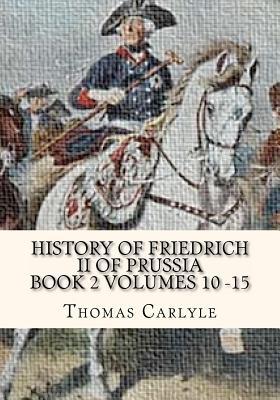History of Friedrich II of Prussia Volumes 10 - 15: Frederick the Great
by Thomas Carlyle
Frederick II of Prussia (Frederick the Great) (January 24, 1712 August 17, 1786) King of Prussia Rein 1740 to 1786. Under his leadership, Prussia created the foremost military power in Europe. Excerpt "KOLITZ, 2d JULY, 1737. This day, the Army not being on march, but allowed to rest itself, Grand Duke Franz went into the woods to hunt. Hunting up and down, he lost himself; did not return at evening; and, as the night closed in and no Generalissimo visible, the Generalissimo AD LATUS (such the title they had contrived for Seckendorf) was in much alarm. Generalissimo AD LATUS ordered out his whole force of drummers, trumpeters: To fling themselves, postwise, deeper and deeper into the woods all round; to drum there, and blow, in ever-widening circle, in prescribed notes, and with all energy, till the Grand Duke were found. Grand Duke being found, Seckendorf remonstrated, rebuked; a thought too earnestly, some say, his temper being flurried,"--voice snuffling somewhat in alt, with lisp to help: --"so that the Grand Duke took offence; flung off in a huff: and always looked askance on the Feldmarschall from that time;"
BUY NOW
Paperback, 788 pages
Published August 31st 2012 by Createspace Independent Publishing Platform
© 2025 Bibleportal.com 版权所有.

Thomas Carlyle was a Scottish satirical writer, essayist, historian and teacher during the Victorian era. He called economics "the dismal science", wrote articles for the Edinburgh Encyclopedia, and became a controversial social commentator.
Coming from a strict Calvinist family, Carlyle was expected by his parents to become a preacher, but while at the University of Edinburgh, he lost his Christian faith. Calvinist values, however, remained with him throughout his life. This combination of a religious temperament with loss of faith in traditional Christianity made Carlyle's work appealing to many Victorians who were grappling with scientific and political changes that threatened the traditional social order.
... Show more